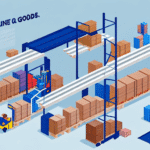Streamlining Business Operations
In today's competitive business environment, efficiency is paramount. Streamlining operations enables companies to deliver products or services faster, cheaper, and with higher quality than competitors. This involves eliminating wasteful processes, optimizing resource use, and ensuring that every step adds value to the customer.
According to a Harvard Business Review study, companies that effectively streamline their operations can see a 20-30% increase in overall efficiency. Streamlining not only reduces costs but also enhances customer satisfaction by providing reliable and timely services, leading to increased loyalty and positive word-of-mouth.
Building a High-Performance Operations Team
Identifying Key Areas for Improvement
To build an effective operations team, it's essential to identify areas that require improvement. This can range from addressing communication breakdowns to upgrading outdated technology. Conducting a thorough analysis of current processes helps in pinpointing inefficiencies and developing targeted strategies for enhancement.
Gathering feedback through surveys and team meetings can provide valuable insights. A report by Gallup highlights that teams that actively seek and implement employee feedback are 25% more productive.
Recruiting Top Talent
Hiring motivated, skilled, and dependable individuals is crucial for a strong operations team. Utilize reputable job boards, collaborate with industry associations, and leverage referral networks to find quality candidates. Offering competitive compensation and comprehensive benefits packages can attract and retain top talent.
According to the Bureau of Labor Statistics, companies that invest in their employees’ well-being see a 15% decrease in turnover rates.
Enhancing Communication and Collaboration
Implementing Effective Communication Channels
Effective communication is the backbone of any successful operations team. Establishing a clear communication hierarchy and utilizing appropriate tools such as project management software, instant messaging, and video conferencing can facilitate seamless collaboration.
Research by McKinsey indicates that better communication practices can enhance team performance by up to 25%.
Fostering a Collaborative Work Environment
A supportive and collaborative work environment boosts productivity and morale. Encourage teamwork by allowing input from all team members and recognizing employee contributions. Organize team-building activities and provide opportunities for professional development to strengthen trust and cooperation.
Leveraging Technology for Operational Efficiency
Adopting Advanced Tools and Systems
Technology plays a critical role in optimizing operations. Implementing project management solutions, customer relationship management (CRM) systems, and automation tools can streamline processes and improve accuracy.
A Gartner report states that businesses adopting automation technologies can increase productivity by up to 40%.
Continuous Technology Assessment
Regularly assess and update your technology stack to ensure it meets the evolving needs of your operations team. Stay informed about industry trends and advancements to maintain a competitive edge.
Implementing Standard Operating Procedures (SOPs)
Standard Operating Procedures (SOPs) are essential for maintaining consistency and efficiency across operations. Developing a comprehensive library of SOPs ensures that all team members follow best practices, reducing errors and enhancing productivity.
Regularly review and update SOPs to reflect changes in processes, technology, and industry regulations. This ensures that the operations team remains aligned with current standards and can adapt to new challenges effectively.
Measuring Performance and Continuous Improvement
Tracking Key Performance Indicators (KPIs)
Measuring performance through Key Performance Indicators (KPIs) is vital for assessing the effectiveness of your operations team. KPIs such as productivity rates, response times, and customer satisfaction scores provide actionable insights into team performance.
According to a study by Forbes, companies that actively use KPIs see a 28% improvement in their operational outcomes.
Promoting a Culture of Continuous Improvement
Encourage a mindset of continuous improvement within your operations team. Regularly review performance data to identify areas for enhancement and implement strategies to address these gaps. Investing in professional development and promoting a culture of learning ensures that your team remains adaptable and capable of managing evolving demands.
Continuous improvement not only enhances efficiency but also fosters innovation, enabling your operations team to stay ahead in a dynamic business landscape.
Handling Challenges and Obstacles
Managing daily operations inevitably involves overcoming challenges and obstacles. Developing contingency plans and maintaining open communication channels are essential for effectively addressing unforeseen issues. Building strong relationships within the team and fostering a collaborative environment enhances the team's resilience and ability to navigate challenges successfully.
According to Mind Tools, teams that proactively address challenges are 30% more likely to achieve their operational goals.
Conclusion
Building a more efficient and effective operations team requires a multifaceted approach that includes streamlining operations, recruiting top talent, enhancing communication, leveraging technology, implementing SOPs, measuring performance, and fostering continuous improvement. By adopting these strategies, businesses can optimize their operations teams to meet changing demands and drive sustained organizational success.




















